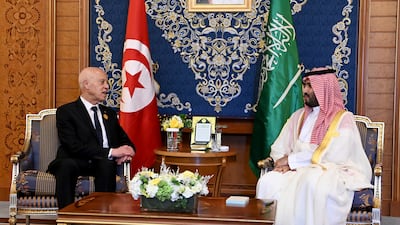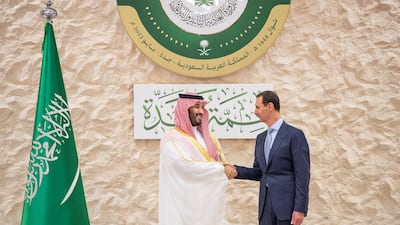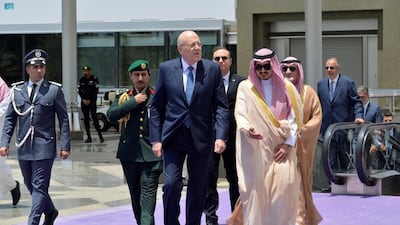The Arab League's annual summit began in Saudi Arabia late on Friday afternoon, with 22 member states taking part.
Syria’s President Bashar Al Assad is returning to the Arab fold at the event in Jeddah – 12 years after his country was suspended by the league, when demonstrations in Syria descended into civil war.
Sheikh Mansour bin Zayed, Vice President, Deputy Prime Minister and Minister of the Presidential Court, is attending the summit on behalf of President Sheikh Mohamed and led a delegation of senior UAE officials, state news agency Wam reported.
The summit began with a speech by Algeria’s delegation, who hosted the last summit in November.
Following months of diplomatic wrangling and efforts by Saudi Arabia and the UAE, Mr Al Assad, once viewed as a pariah, finally touched down in the Saudi coastal city late on Thursday, after Riyadh managed to gather enough consensus to reinstate Syria.
Mr Assad appeared relaxed as he was greeted on the tarmac by Prince Badr bin Sultan, deputy governor of Makkah, along with Arab League Secretary General Ahmed Aboul Gheit and several Saudi officials.

The heads of states of the UAE, Kuwait, Morocco, Algeria, Oman, Sudan and Lebanon will be sending representatives to the summit.
Ukrainian President Volodymyr Zelenskyy attended the summit as a guest of honour in Saudi Arabia. The leader is making a quick stop in Jeddah before joining the G7 leaders' meeting in Hiroshima, Japan.

Mr Zelenskyy confirmed it was his first visit to the kingdom, during which he was hoping to help strengthen Ukraine’s relationship with the Arab world.
“Political prisoners in Crimea and temporarily occupied territories, the return of our people, Peace Formula, energy co-operation. KSA plays a significant role and we are ready to take our co-operation to a new level,” he tweeted from Jeddah.
Agenda plan for 2023
While it was still unclear whether he will meet other Arab leaders on Friday, Mr Assad has been confirmed as the head of Syria’s delegation at the general assembly at the Ritz Carlton, when the Arab League convenes its 32nd summit.
Mr Al Assad will address the afternoon gathering in Jeddah, his first to his Arab peers on a regional stage since the conflict in Syria began.
The league is expected to pass 32 draft resolutions as part of the Arab action plan for 2023 that will focus on “renewal and change”, a person with knowledge of the matter confirmed to The National.
Top of the list of topics on which decisions will be made on Friday will be the conflict in the Gaza Strip and the West Bank.
The Sudan crisis will also be a major focus of the league's action plan, with the final communique expected to call for continued joint Arab efforts to reach a permanent and immediate ceasefire in Khartoum.
For a week and a half, representatives of the two Sudanese camps have been locked in negotiations brokered by Saudi and US officials.
In 2011, the Arab League suspended Syria's membership over the suppression of protests against Mr Al Assad's rule.
With Syria's return to the league, discussions on Friday will also focus on the impact of its 12-year civil war and measures to address reconstruction and the safe return of refugees.
The situation in Lebanon will also be discussed, a source confirmed, especially the impact of a presidential vacuum and the dire economic conditions the country faces.
Atmosphere of optimism
Speaking on the eve of the summit, GCC Secretary General Jasem Albudaiwi told reporters that the positive atmosphere at the Jeddah summit would eventually reverberate across the region, despite the remaining geopolitical challenges.
“We haven’t had an Arab League summit participation at this level for several years, especially during the past decade,” he said.
“What we’re witnessing in terms of positive re-engagement in the weeks leading up to the summit can only translate to positive outcomes after Friday’s summit.”
Saudi Crown Prince Mohammed bin Salman has been pushing for peace in the region and over the past months.
Riyadh has improved its relations with Iran, restored ties with Syria and is ending the kingdom’s years-long war in Yemen.
Iran, a main backer of the Syrian government in the country's conflict, signed an agreement in China in March to resume relations with Saudi Arabia.
Tehran has also expressed its support for Damascus’s rapprochement with its regional neighbours.
The renewed Saudi-Iran ties are expected to have a positive effect on Middle East countries where the two support rival groups.
In March, Saudi Foreign Minister Prince Faisal bin Farhan first hinted at increased engagement with Syria.
Prince Faisal said consensus had been building in the Arab world that isolating Syria was not working and dialogue was needed, particularly to address the humanitarian situation in the country.
Mr Al Assad benefitted from the support of Arab states after the earthquake on February 6 that killed thousands of people in Syria.

In 2018, the UAE was among the first to re-establish full ties with Syria, and it has been leading the charge to reintegrate Damascus.
President Sheikh Mohamed also met Mr Al Assad in Abu Dhabi in March, with the two leaders discussing regional stability.
Sanam Vakil, director of the Middle East and North Africa programme at think tank Chatham House, told The National that Saudi Arabia was investing in its diplomatic policy as it sought to realign the region’s conflicts.
“I think Riyadh has certainly been, for a few years now, prioritising its domestic economy and seeks to lower the regional temperature in order to guarantee a more stable investment environment in the region,” Ms Vakil said.
“For a few years, actually, there has been a shift where Prince Mohammed bin Salman has prioritised or supported efforts to draw down the war in Yemen.
“We also saw the AlUla agreement, we've seen rapprochement between Turkey and Saudi Arabia, in addition to all of the flurry of the de-escalation that we've seen among other countries as well.”
Saudi political analyst Khaled Al Batarfi said Riyadh needs to realign the region’s security in order to prioritise its domestic policy ambitions under its Vision 2030 programme.
“We have to remember when Crown Prince Mohammed bin Salman said all those years ago that he envisioned the Middle East region becoming the new Europe. For that to happen, the region has to be unified and we’re witnessing that foreign policy change in action not just during this week’s summit but in the year ahead,” Mr Batarfi told The National.
While unity may be the goal Riyadh and its neighbours seek, Friday’s summit may not achieve complete consensus on some issues, including the return of Syria.
Last year, Qatar remained one of the few Arab countries that said it would refuse to even consider normalising ties with Syria.
Earlier this month, however, Qatar made clear it opposed normalising its own ties with Damascus but said it would not stand in the way of an Arab consensus. Alongside Qatar, Kuwait and Morocco still remain opposed to fully normalising relations with Syria.
Meanwhile, Arab reconciliation with the Assad government still faces opposition from Washington DC, where a bipartisan group of lawmakers introduced a bill on Thursday intended to bar the American government from recognising Mr Assad as Syria's president and to enhance Washington's ability to impose sanctions.
The bill would prohibit the government from recognising or normalising relations with any Syrian government led by Mr Al Assad, who is under US sanctions, and expands on the Caesar Act, which imposed a tough round of sanctions on Syria in 2020.






















































